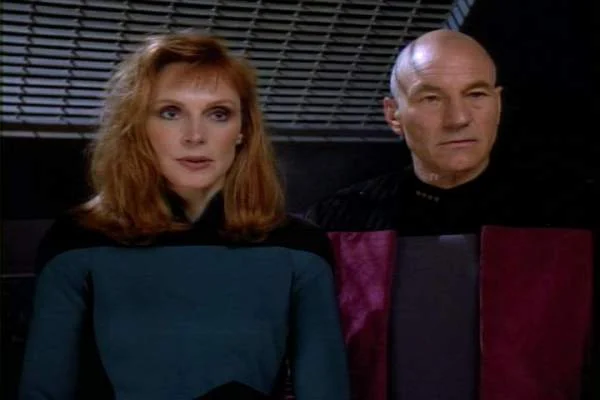Ship’s captains have been an important part of genre fiction for a long time. Thusly, in our first genre feature series, we’re looking at ship’s captains. Today’s captain is Jean-Luc Picard of the USS Enterprise D.
Picard, while still the protagonist of his story, was a much different captain from Kirk. Where Kirk was a brash, sometimes insensitive fighter, who took on many of his ship’s problems for himself, Picard was a sensitive and thinking delegator. His personal powers of intuition still factored heavily into his character – he wouldn’t have made a very good captain without them – but he was much more thoughtful and reserved in most situations.

Picard often even remained on the bridge to deal with on-ship situations while his first officer took command of the landing parties. He allowed other crew members to act as warrior and diplomat, being a much stronger leader, and utilizing his team to a much better effect than any other Star Trek protagonist.
This meant that, while the show was still, at its heart, about Picard and his journey to save mankind, the other members of his crew managed to get a lot of character development in. Even the romance in the story was mostly left to other characters.
The Enterprise D was also a much different ship in that it was essentially a space-faring city. The ship was intended to be on an indefinite mission of exploration, and thusly crew members brought their families with them on the voyage. The presence of children on the ship offered new opportunities for character development in all of the characters, but most dynamically in Picard who begins the series with a strong aversion to the presence of children on his ship, but over the seven year voyage, and many strange adventures (including interactions with Wesley crusher, the boy helmsman, and being time-reversed into a child himself for one episode) he began to soften, eventually enjoying the presence of children.
One of Picard’s great antagonists was the Borg, a collective intellect which grew by subjugating organic sentient races, and implanting them with cybernetic enhancements which completely take over their bodies. They fought and moved like zombies, but they had the technological edge over the crew, and so were dangerous foes.

One of the most important events in the development of Picard as a character was a several episode arc, beginning with the finale of the third season, in which Picard himself was captured by the Borg, and partially assimilated to serve as a liaison between the Borg and humans. When finally rescued, he was a changed man. His instincts and emotions had changed, making him a more visceral, and ultimately more compelling, captain, a strength tempered by a new internal fire, an anger at the Borg which steeps and boils for the remainder of his story.
In all portrayals of Picard, the character is played by Patrick Stewart, an actor from the British Shakespeare tradition who brought a lot to the role, and as the series continues, Stewart’s influence over the character gets noticeably stronger, developing the mannerisms and characterizations which become so familiar to all of us over the years.
All in all, Picard was written to be the perfect captain for this ship, but without Stewart’s style, the show would likely not have been the great success it was, and the Trek franchise may have died with that attempt.
Come back tomorrow when we will feature Captain Malcom Reynolds. If there is a Ship’s captain which you would like to see featured in this series, let us know in the comments.






